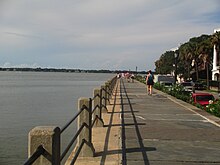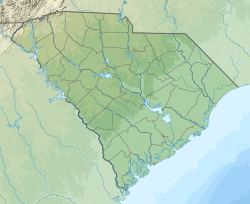
Back Charleston, Suid-Carolina Afrikaans Charleston (Carolina d'o Sud) AN تشارلستون (كارولاينا الجنوبية) Arabic تشارلستون (ساوث كارولاينا) ARZ Charleston (Carolina del Sur) AST Çarlston (Cənubi Karolina) Azerbaijani چارلستون، جنوبی کارولینا AZB Чарлстан (Паўднёвая Караліна) Byelorussian Чарлстън (Южна Каролина) Bulgarian চার্লসটন, সাউথ ক্যারোলাইনা Bengali/Bangla
Charleston | |
|---|---|
| Nickname: The Holy City[1] | |
| Motto(s): | |
 Interactive map of Charleston | |
| Coordinates: 32°47′00″N 79°55′55″W / 32.78333°N 79.93194°W | |
| Country | United States |
| State | South Carolina |
| Counties | Charleston, Berkeley |
| Founded | 1670 |
| Chartered | 1783 |
| Named for | Charles II of England |
| Government | |
| • Type | Mayor–council |
| • Mayor | William S. Cogswell Jr. (R) |
| Area | |
• Total | 135.51 sq mi (350.97 km2) |
| • Land | 115.03 sq mi (297.93 km2) |
| • Water | 20.48 sq mi (53.04 km2) 15.11% |
| Elevation | 20 ft (6 m) |
| Population | |
• Total | 150,227 |
• Estimate (2023)[6] | 155,369 |
| • Rank | 174th in the United States 1st in South Carolina |
| • Density | 1,305.97/sq mi (504.24/km2) |
| • Urban | 684,773 (US: 63rd) |
| • Urban density | 2,019.6/sq mi (779.8/km2) |
| • Metro | 849,417 (US: 71st) |
| • Demonym | Charlestonian |
| Time zone | UTC−5 (EST) |
| • Summer (DST) | UTC−4 (EDT) |
| ZIP Codes | 29401–29407, 29409–29410, 29412–29420, 29422–29425, 29492 |
| Area codes | 843, 854 |
| FIPS code | 45-13330 |
| GNIS feature ID | 1221516[8] |
| Website | charleston-sc |

Charleston is the most populous city in the U.S. state of South Carolina, the county seat of Charleston County,[9] and the principal city in the Charleston metropolitan area.[b] The city lies just south of the geographical midpoint of South Carolina's coastline on Charleston Harbor, an inlet of the Atlantic Ocean formed by the confluence of the Ashley, Cooper, and Wando rivers. Charleston had a population of 150,227 at the 2020 census.[6] The population of the Charleston metropolitan area, comprising Berkeley, Charleston, and Dorchester counties, was estimated to be 849,417 in 2023.[7] It ranks as the third-most populous metropolitan statistical area in the state, and the 71st-most populous in the United States.
Charleston was founded by the British in 1670 as Charles Town (also spelled Charles Towne and Charlestowne through the end of the 17th century),[10] in honor of King Charles II. The settlement was first established at Albemarle Point on the west bank of the Ashley River (now Charles Towne Landing), but it was relocated in 1680 to its present site and within ten years grew to become the fifth-largest city in North America. Charleston remained unincorporated throughout the colonial period; its government was handled directly by a colonial legislature and a governor sent by Parliament. Election districts were organized according to Anglican parishes, and some social services were managed by Anglican wardens and vestries. Charleston adopted its present spelling upon its incorporation as a city in 1783. Population growth in the interior of South Carolina influenced the removal of the state government to Columbia in 1788, but Charleston remained among the ten largest cities in the United States through the 1840 census.[11]
Charleston's significance in American history is tied to its role as a major slave trading port. Charleston slave traders like Joseph Wragg were the first to break through the monopoly of the Royal African Company and pioneered the large-scale slave trade of the 18th century; almost one-half of enslaved people imported to the United States arrived in Charleston.[12] In 2018, the city formally apologized for its role in the American slave trade.[13]
- ^ "Why is Charleston Called the Holy City?". Low Country Walking Tours. Archived from the original on August 10, 2020. Retrieved November 28, 2020.
- ^ Trouche, Michael (January 28, 2014), "Enlightening Latin", Charleston Footprints, archived from the original on October 9, 2016, retrieved October 9, 2016
- ^ Schultz, Rebecca, "The Seal of the City of Charleston", Official website, City of Charleston, archived from the original on May 4, 2013, retrieved December 9, 2010
- ^ "ArcGIS REST Services Directory". United States Census Bureau. Retrieved October 15, 2022.
- ^ "Census Population API". United States Census Bureau. Retrieved October 15, 2022.
- ^ a b "QuickFacts: Charleston city, South Carolina". United States Census Bureau. Retrieved May 16, 2024.
- ^ a b "Metropolitan and Micropolitan Statistical Areas Population Totals: 2020-2023". United States Census Bureau, Population Division. March 14, 2024. Retrieved March 15, 2024.
- ^ "US Board on Geographic Names". United States Geological Survey. October 25, 2007. Archived from the original on March 3, 2018. Retrieved October 1, 2016.
- ^ "Find a County". National Association of Counties. Archived from the original on May 31, 2011. Retrieved June 7, 2011.
- ^ Nic Butler, PhD (August 9, 2019). "The evolution of Charleston's name". Charleston County Public Library. Retrieved December 31, 2024.
- ^ "Population of the 100 Largest Urban Places: 1840". Archived from the original on April 20, 2008.
- ^ Michael Kimmelman, "Charleston Needs That African American Museum. And Now." Archived March 29, 2018, at the Wayback Machine, The New York Times, March 29, 2018; accessed March 29, 2018
- ^ "Charleston, where 40% of all US slaves entered the country, finally apologizes for its role in the slave trade". CNN. June 19, 2018. Archived from the original on December 8, 2019. Retrieved December 8, 2019.
Cite error: There are <ref group=lower-alpha> tags or {{efn}} templates on this page, but the references will not show without a {{reflist|group=lower-alpha}} template or {{notelist}} template (see the help page).









